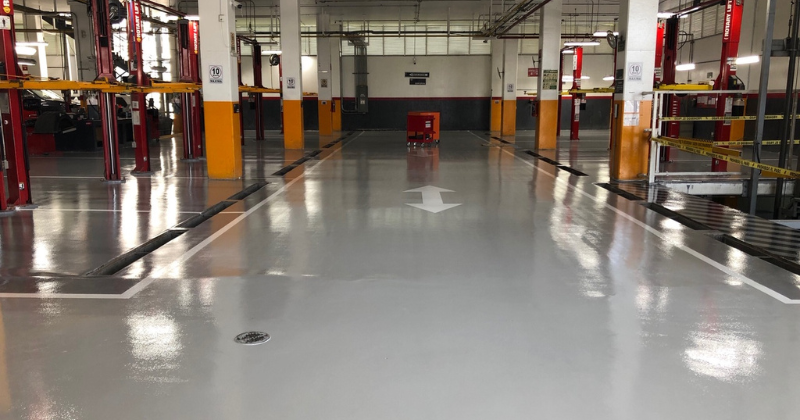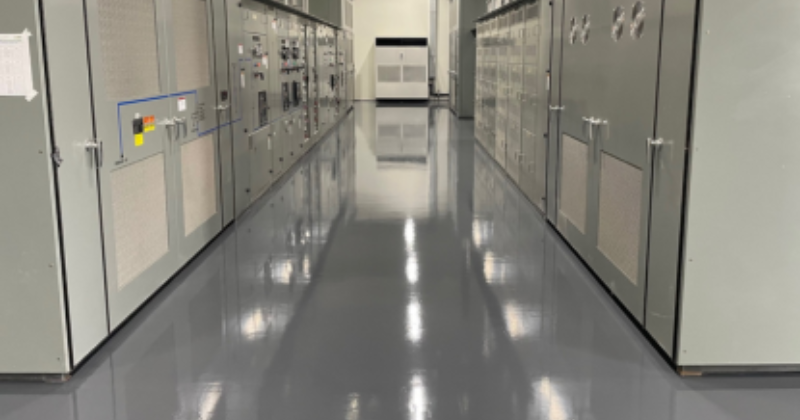CHOOSING THE RIGHT FLOOR FOR YOUR FACILITY
WATCH: Stonhard expert Kyle Tierney discusses the difference between resinous floor coatings and systems in commercial and industrial spaces.
With So Many Choices, How do I Choose a Flooring System for my Facility?
With today’s ease of access to information, finding a resinous flooring system for your facility has never been easier. However, the abundance of information on these products has made it harder to narrow down which one is the right one for your space. Flooring manufacturers offer everything from water-based/solvent-free systems, to fast curing or green technology all in the form of epoxy, polyurethane, methyl methacrylate, or polyasparctic options. To make matters even more complicated, depending on the manufacturer’s range of options, you have to decide whether you just need a simple floor coating, a high-build intermediary system, or a troweled mortar system. All of these systems are designed to protect and enhance your facility’s concrete floor, but they offer varying levels of strength and capability.
A Must: Resinous Floors that Protect Concrete
Concrete is a great building material -- strong, adaptable, economical, and widely available, but it is also porous, susceptible to chemical attack and relatively poor when subjected to impact, abrasion and wear. The resinous flooring system you choose should be capable of protecting your concrete from the environment and activities unique to your operations as well as the host of issues that are created by those activities including dust and dirt, water spillage, heating and cooling, bacterial growth and contact with organic acids, grease, oils and chemicals.

Is a Coating System Good Enough?
Let’s take an automotive service facility for example. While impact from tools and chemical exposure from battery acids, oils, and coolants are a primary concern, auto dealerships also desire floors to be clean, bright and slip resistant for employees and customers. A coating system would solve the clean, bright and, with some added texture, slip resistant requirements, but it is unlikely to protect the concrete below from falling wrenches, parts, and heavy impacts common when working on vehicles. Coatings are simply too thin, at 10 to 20 mils (0.25 to 0.5 mm), to provide significant protection for the concrete to which they are bonded. While technical data would show the coating material to be incredibly strong, these thinner coatings cannot absorb enough of the impact energy before it reaches the weaker concrete layer below (just as the durable technology used in a vehicle’s paint is unable to protect it from a collision). The end result is the chipping and flaking away of your new flooring. In this scenario, a more complex system is needed to fully protect the concrete below.
You Know Your Facility Conditions Best
Any commercial or industrial facility can find similar examples from perspectives of hygiene, abrasion, infection control, design aesthetics, chemical resistance, slip resistance or flooring lifespan. Whatever type of facility you work in, you know the environment’s conditions better than anyone. Without researching a single resinous floor system, you can outline the conditions of your space and expectations you have in order to get the best value and performance from your floor. After that, have a flooring expert help you through the rest. They will you find a solution that fits your requirements.

Best Value Flooring Systems – Light-Duty vs. Heavy-Duty Environments
If you are in a light-duty environment or are only temporarily leasing the space, the protection and enhancement of a coating system might provide excellent value and give you years of good service. However, if your environment is more demanding and exposed concrete would lead to chemical attack or hygienic concerns, or the aesthetics of minor coating damage will affect your business and the client’s impression of your space, a coating system is not likely to provide the level of protection and enhancement you would demand from your floor. Intermediary systems, 1/16” to 1/8” (1.5 to 3 mm), can offer a great increase in performance while still being economical and trowelled mortar systems, 3/16” to 3/8” (5 to 8 mm) and above offer exceptional performance and a better return on investment due to their higher quality properties and dramatically longer life spans.
For nearly a century, Stonhard has been solving floor problems. With epoxy, urethane, and MMA seamless flooring systems, Stonhard has the right flooring system for any environment in any industry. We work with you directly from product selection through installation. Our local territory managers, architectural/engineering representatives and design teams will help you select the ideal flooring solution and our application teams will install your products, adhering to regulations and details, while honoring your work schedule. Stonhard offers a single-source warranty on both products and installation. Contact us to set up a site visit today.